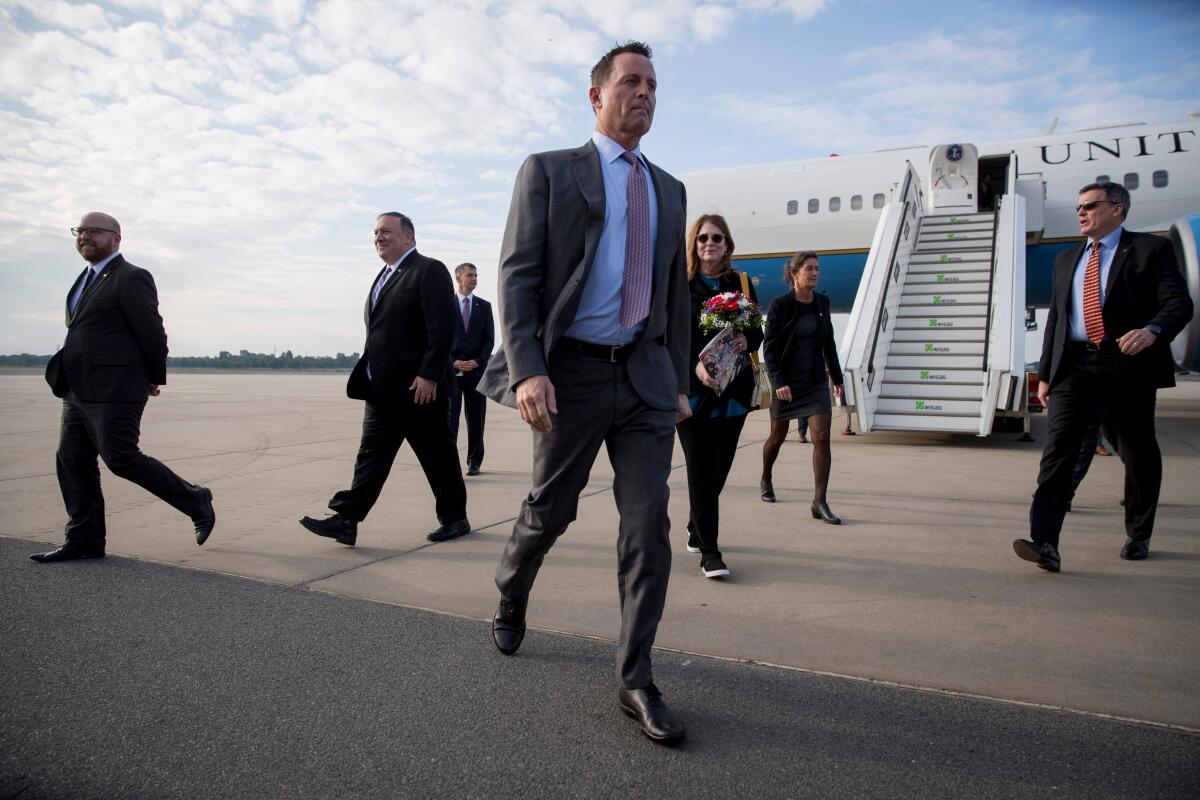Germans demand U.S. ambassador, a ‘biased propaganda machine,’ be replaced

Richard Grenell, the outspoken U.S. ambassador to Germany, has a penchant for making waves.
And he’s been making waves — however unwittingly — with his appointment by President Trump as acting director of national intelligence.
The 53-year-old diplomat, a staunch loyalist of the president, will hold onto his post at the U.S. Embassy in Germany while leading the coordination of intelligence agencies in Washington. That has drawn criticism from some German leaders, who fear the lack of a full-time ambassador shows the U.S. has downgraded the relationship.
“It’s an illustration of how unimportant Germany is in their view,“ said Nils Schmid, a leader in Parliament for the center-left Social Democrats, who share power with Chancellor Angela Merkel’s conservatives. “President Trump should name a successor who isn’t a biased propaganda machine but instead will present Germany’s position in Washington,“ he told Der Spiegel magazine. Schmid also said Grenell’s work as ambassador had been a “nadir in German-American relations.”
Alexander Lambsdorff, another leader in Parliament for the opposition Free Democrats, said he feared Germany was being relegated to second-rate status by Washington. “It’s just not possible,” he said, “to coordinate 17 intelligence agencies and work on German-American relations at the same time, no matter how hard you work.“
“In times like these, we need a full-time U.S. ambassador,“ added Johann Wadephul, a leader in Merkel’s conservative party.
Grenell, a former Fox news commentator and longtime aide to John Bolton, has been in the headlines in Germany since he arrived in May 2018 — filling the post after a protracted eight-month-long Senate confirmation battle. He wasted no time showing Germany he would lead the country’s most important foreign embassy with a more direct style than that of his predecessors — including Phil Murphy, now the governor of New Jersey, and John B. Emerson, the vice chairman of Capital Group in Los Angeles.
On his first day on the job in Berlin, Grenell — who previously taught at the USC Annenberg School of Communication and maintains a house in Palm Springs — warned German companies setting up new business ties with Iran despite Trump’s decision to quit the Iran nuclear deal to “wind down operations immediately.” He posted the blunt message on Twitter that many German companies — with far more extensive business interests in the United States than Iran — quickly heeded. The United States is Germany’s most important trading partner in Europe and the largest market for its exports.
It was nevertheless an unusually public intervention and led to backlash from German political leaders and the country’s public at large. Germans have long held the United States and U.S. Embassy in high regard for defending West Germany throughout the Cold War and for the unflinching support for German reunification in 1990, backing that was decisive in overcoming resistance in other European capitals.
Grenell, who was a spokesman for the U.N. mission to the United States during most of President George W. Bush’s eight years in office, raised eyebrows in Germany and other European countries with remarks to Breitbart News that were criticized in Berlin as a provocation and seen by some as a rallying cry for parties like the ostracized far-right Alternative for Germany: “I absolutely want to empower other conservatives throughout Europe.”
Unaccustomed to such remarks from an ambassador of a close ally, the German government formally asked the U.S. government for clarification. Meanwhile, the State Department defended Grenell’s remarks. Martin Schulz, the former leader of the center-left SPD who was defeated by Merkel in 2017, called the comments “insufferable.” Schulz added: “Grenell isn’t behaving like a diplomat but instead like a right-wing extremist colonial governor.”
With an unmistakable style resembling Trump’s, Grenell has been an unabashed irritant to Germany ever since. Like Trump, he has openly criticized Germany on several fronts, especially for not spending enough on its own defense and falling far short on fulfilling pledges made to NATO to raise its defense expenditures to 2% of gross domestic product. The message was similar to past complaints about Germany on defense spending made to Berlin by previous U.S. administrations, but the gripes had not been made as openly before 2017.
Whether it can all be attributed to Trump and Grenell, Germany has in any case increased its defense spending considerably, ramping it up by 25% in the last three years to $55 billion in 2020. There are more than 30,000 U.S. troops stationed in Germany, and the country relies heavily on the United States for its security.
Grenell also has pressed Germany to open its natural gas markets to U.S. liquefied natural gas while lambasting the country for its controversial Nord Stream 2 gas pipeline project with Russia.
He successfully pressured Germany to take back a former Nazi labor camp guard, Jakiw Palij, in August of 2018 who had been living in New York — he died shortly after being repatriated to Germany at the age of 95.
And he pushed Germany to ban Hezbollah, the Lebanese militant group, in its entirety, arguing the Lebanese paramilitary organization supported terrorism and anti-Semitism. A resolution that Grenell called for was passed by the German Parliament in December.
He also has openly and repeatedly criticized Germany for not following U.S. advice to block China’s Huawei from taking part in the development of Germany’s 5G network over worries it could be used for espionage or sabotage.
“He certainly made everyone in Germany uncomfortable, but I never understood why the German government seemed to keep such a distance to Grenell,” said Thomas Jaeger, a political scientist at the University of Cologne in Germany, referring to a 2018 Der Spiegel magazine article that said Grenell was largely ostracized by Germany’s political establishment.
“He had no qualms about putting the German government under pressure in public, which might not have always been the smartest thing to do,” Jaeger said. “But everyone knew Trump listened closely to him. I think they could have used that connection a lot better. In any case, Grenell has been highly effective in getting Germany to talk more about defense spending and about the Nord Stream 2 pipeline. The public opinion on those two issues has changed, and Grenell certainly had a role in that.”
It’s customary for ambassadors to refrain from commenting on successors, and several former U.S. ambassadors to Germany contacted declined to comment on Grenell’s plans to remain ambassador. In a column in Die Welt newspaper in 2018, John Kornblum, who served as ambassador from 1997 to 2001 and remained in Berlin as a consultant and commentator on transatlantic issues, nevertheless publicly urged Germans to try to see the bright side and appreciate Grenell’s close ties to the White House.
“Rather than grumbling about the different tone of Ambassador Grenell’s statements, it would be better to take advantage of the chance to talk with someone who is not afraid to reflect the President’s views and who has access to his senior assistants,” Kornblum wrote. “Whether one likes what the Ambassador says or not, he can be an important interpreter between Germany and a President who seems bored with most diplomatic duties.”
That did not stop some German members of Parliament, such as Wolfgang Kubicki a member of the Free Democrats and vice president of Parliament, from suggesting that Grenell should be expelled from Germany and declared persona non grata after he criticized the government’s budget plans and defense spending.
Peter Beyer, Merkel’s transatlantic coordinator in the Foreign Ministry, said in a recent interview that he had frequent dealings with Grenell and always held him in high regard even though there were disagreements at times. Beyer said he sensed that Grenell was losing interest in Germany and was more tuned into Washington.
“I’ve had many candid discussions with Rick over the last few years and enjoyed those talks even though we didn’t always see eye-to-eye,” said Beyer, who is also a conservative member of Parliament.
There were less charitable views of Grenell in Berlin. Christiane Hoffmann, a journalist at Der Spiegel newsmagazine, wrote: “Grenell hasn’t accomplished a thing with his blustering approach…. His rude attacks had an audience of one in mind: Donald Trump. The ambassador’s German-bashing is designed to score points with the President and didn’t change a thing.”
Malte Lehming, a journalist at Der Tagesspiegel newspaper, wrote that Grenell was going to be more important to Germany than ever before. “He got on everyone’s nerves for a long time but now Germany is going to have to get along with him. Germany is highly dependent on the United States in the fight against terror so a good relationship to Grenell is going to be essential.”
Kirschbaum is a Times special correspondent.
More to Read
Start your day right
Sign up for Essential California for news, features and recommendations from the L.A. Times and beyond in your inbox six days a week.
You may occasionally receive promotional content from the Los Angeles Times.






